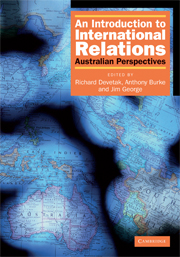Book contents
- Frontmatter
- Contents
- List of tables, figures and boxes
- List of contributors
- Preface and acknowledgments
- An introduction to international relations: the origins and changing agendas of a discipline
- 1 Theory and practice in Australian international relations: the search for identity and security
- Part 1 Theories of international relations
- Part 2 The traditional agenda: states, war and law
- Part 3 The new agenda: globalisation and global governance
- 20 Multilateral economic institutions
- 21 Global trade
- 22 Global finance
- 23 Non-state actors: multinational corporations and international non-governmental organisations
- 24 Global poverty and inequality
- 25 Globalisation and its critics
- 26 The globalisation of Islam
- 27 Global terrorism
- 28 Humanitarianism and armed intervention
- 29 Human rights
- 30 Migration and refugees
- 31 Global environmental politics
- 32 Global governance and the United Nations
- Glossary of terms
- Bibliography
- Index
- References
28 - Humanitarianism and armed intervention
from Part 3 - The new agenda: globalisation and global governance
- Frontmatter
- Contents
- List of tables, figures and boxes
- List of contributors
- Preface and acknowledgments
- An introduction to international relations: the origins and changing agendas of a discipline
- 1 Theory and practice in Australian international relations: the search for identity and security
- Part 1 Theories of international relations
- Part 2 The traditional agenda: states, war and law
- Part 3 The new agenda: globalisation and global governance
- 20 Multilateral economic institutions
- 21 Global trade
- 22 Global finance
- 23 Non-state actors: multinational corporations and international non-governmental organisations
- 24 Global poverty and inequality
- 25 Globalisation and its critics
- 26 The globalisation of Islam
- 27 Global terrorism
- 28 Humanitarianism and armed intervention
- 29 Human rights
- 30 Migration and refugees
- 31 Global environmental politics
- 32 Global governance and the United Nations
- Glossary of terms
- Bibliography
- Index
- References
Summary
Introduction
This chapter begins by briefly outlining some of the key principles and concepts that are widely viewed as comprising the core of modern humanitarianism. It then outlines why and how humanitarian ideas and concerns have become more prominent in international relations, before reflecting on the challenges posed and faced by humanitarianism.
The basic idea that underpins humanitarianism – that we have an obligation to assist others who are suffering – is an old one that can be found in many cultures across the world. For many years, humanitarianism was an issue that dwelt in the margins of international relations thinking, yet humanitarianism now forms a central plank of the ‘new agenda’ of international relations. It permeates a variety of issues in the contemporary agenda of world politics, such as debates about security, intervention, international law, human rights and development. Humanitarian concerns are the subject of transnational civil society activism, and increasingly referred to by states and the UN as central dimensions of their policies. Increasingly the provision of humanitarian assistance or protection is invoked as a way of demanding or legitimating particular actions, including armed intervention.
Key concepts and questions
Humanitarianism is important because it poses difficult questions to us about the nature of our moral communities and the relationship between our moral and political communities. By moral community I mean those to whom we feel we owe obligations and who owe them to us. How far does this community extend?
- Type
- Chapter
- Information
- An Introduction to International RelationsAustralian Perspectives, pp. 329 - 339Publisher: Cambridge University PressPrint publication year: 2007



